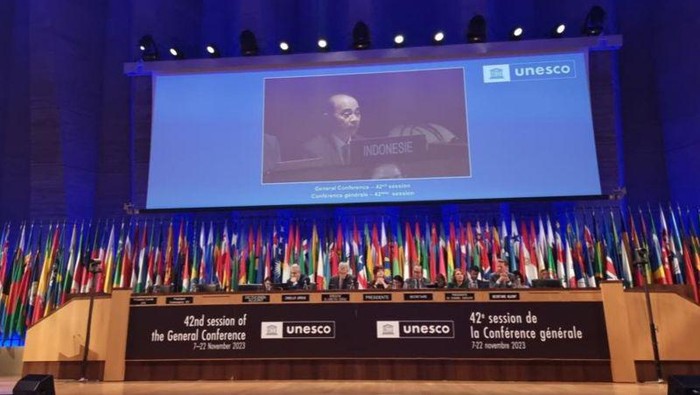Indonesian becomes the tenth official language of UNESCO
The recognition was granted yesterday during the 42nd plenary session of the UN cultural organisation at its Paris headquarters. For President Widodo, it is "a source of pride and satisfaction". Language has played a key element in unifying the country since the Declaration of Independence and the birth of the Republic. Indonesians are happy about it.
Jakarta (AsiaNews) – The Indonesian language has recently become an official language at UNESCO.
For a long time, it has been a guarantor of unity and a factor of identification for the many groups and tribes that make up the archipelago, many of whom have their own native language.
"The 42nd plenary session" of the UN agency specialised in education, culture and science has "recognised our Indonesia language as an official language," said President Joko "Jokowi" Widodo late yesterday afternoon.
This is a source of pride and satisfaction for all the people of the Asian nation. Following the president’s announcement, many Indonesians took to social media posting messages full of pride and patriotism over the shared Indonesian language (Bahasa Indonesia).
"The news appeared in UNESCO's media under the title 'Recognition of Bahasa Indonesia as the official language of the General Conference' of the agency of the United Nations,” President Widodo said.
In Paris, where the organisation is headquartered, the Indonesian ambassador to France, Mohamad Oemar, hailed the decision, noting that the language embodies a strong spirit of belonging to the country.
The diplomat stressed that “Bahasa Indonesia has played its strategic influential and powerful role to unite us as a pluralistic nation.”
Historically, the language was one of the most important factors for unification, starting with the birth of the modern Republic on 17 August 1945, when the founding fathers Soekarno and Mohammad Hatta declared independence.
Indonesia is a highly diverse country with hundreds of ethnic groups, each with its own mother tongue. In some remote areas of Kalimantan, Sulawesi, Moluccas, North Sumatra, and Papua, each village has its own language.
How can a multi-ethnic society be "united"? The problem has been overcome by finding a shared basis in the Indonesian language, the national language.
This was the work of dozens of young people – from different ethnic backgrounds but all nationalists – who, on 28 October 1928, unanimously took the ‘Youth Pledge’ (Sumpah Pemuda), a declaration meant to define their identity at the Second Youth Congress.
The pledge was centred on three ideas: one motherland, one nation, and a unifying language
That is why today, almost a century later, Indonesians have enthusiastically embraced UNESCO's announcement, which makes Indonesian the tenth official language of the UN agency along with English, Arabic, Mandarin Chinese, French, Spanish, Russian, Hindi, Italian and Portuguese.
16/06/2022 15:04







.png)










